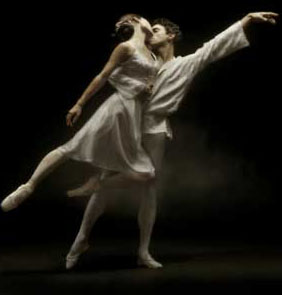Valentine’s Gift: A Great Romeo and Juliet
Camille LeFevre went to the Metropolitan Ballet's "Romeo and Juliet" without high hopes, but was carried away by this stellar production. Can the Metropolitan keep it up?

With a certain amount of trepidation, I took in the matinee of The Metropolitan Ballet’s Romeo and Juliet last Sunday. It’s my “job” as a dance critic (freelance or not) to keep up (as best I can) with all the companies and choreographers in town, even if their inaugural production was an utter disaster.
You remember. The ballet’s founder, producer, director and sometime choreographer, Erik J. Sanborn, premiered his company last fall with the ill-begotten Dracula, a super-size (i.e., numbers of set changes, dancers, choreographers involved) debacle exacerbated by Sanborn’s announcement that The Metropolitan Ballet was Minnesota’s new “flagship ballet” (see Lightsey Darst’s review).
I don’t mean to beat a dead horse, even though Dracula remains a topic of rabid discussion and consternation in the dance community. Put simply, a production like that isn’t easily forgotten—as much as I might want to. Contrary to popular belief, it’s not at all fun to trash a production on which boatloads of people have worked very hard (although, obviously, not hard enough).
That said, I’m thrilled to report that The Metropolitan Ballet’s second venture, a remounting of Romeo and Juliet (Sanborn has produced the ballet before) was an unqualified success. The two-hour production was a captivating, compelling piece of storytelling, in which beautifully painted sets, sumptuous costumes, evocative lighting, Prokofiev’s score, Gregory Drotar’s choreography, a large and capable cast, and outstanding principal dancers merged in a seamless whole.
A case of arriving with low expectations that were exceeded? I don’t think so. By the end of the third second scene, I’d decided Romeo and Juliet was worth talking about. It was the ballroom scene, in which the warring Capulet and Montague families (and their tribes), having been relieved of their swords by the Prince of Verona (Patrick Scully), partner each other with controlled austerity, taunt each other with rambunctious leaps, parry each other with empty sword thrusts, and spear each other with lethal stares.
Out of this precisely composed swirl of color, light and action emerged Juliet (Mifa Ko) and Romeo (Ramon Theilen), whose megawatt smiles and youthful giddiness threatened to obliterate their artistry. But they’re simply too good. From the moment they set eyes on each other, you can feel their mutual attraction. I got the sense this wasn’t just superb acting; that Ko and Theilen like and respect each other as people and artists.
Animated, sculptural and muscular, Theilen (a principal with Dance Theater of Harlem) exudes a warmth, care and tenderness that tempers his passion. Perfect, because Ko is just a wisp of thing whose arms ripple like ribbons as Theilen grasps her waist. She sends off invisible sparks as she flits around him, her skirts aswirl like tiny starbursts. During the first kiss, he elevates her delicately off her toe shoes.
Later, during the exquisitely danced balcony scene, she flies weightlessly into his arms and he positions her beautifully along his side, or high overhead, or spinning out from his firm grasp. It was, quite simply, breathtaking. In the shadowy crypt scene, which opens with a menacing, milling crowd of black-cloaked shades, Ko evinces the horror of Juliet finding Romeo dead with the potency of a jagged spasm and Butoh-like silent scream.
Framing the star-crossed lovers were joyous village scenes filled with leapfrogging children and seductively frolicking adults. The blond Vitali Krauchenka portrayed Tybalt with the sadism of a S.S. officer. The exuberant Gerardo Gil portrayed Mercutio as a good-time guy and loyal friend. Juliet’s “Friends,” in their filmy white knee-length gowns, were hesitant at times, but gained confidence as the performance continued.
Sweet was the word that repeatedly came to mind as I was borne away by the production. This Romeo and Juliet was infused with a sweetness that (almost always) steered clear of saccharine by virtue of chemistry, artistry and excellent production values. It appears, after all, that Sanborn has got the goods. But, from here on in, can consistently produce high-quality ballets?
He’s one-down, one-up in this inaugural three-part season. The Metropolitan Ballet’s summer concert—which pairs the reconstruction of Agnes de Mille’s iconic Rodeo with Minneapolis choreographer Jennifer Hart’s neoclassical take on A Midsummer Night’s Dream—will determine a lot. Not whether the company’s of flagship-ballet status (there’s a lot more proving to be done, on stage and within the dance community, before that could happen). But whether this pick-up company created for one lovely principal ballerina, Mifa Ko, can sustain some measure of credibility and excellence beyond one production.